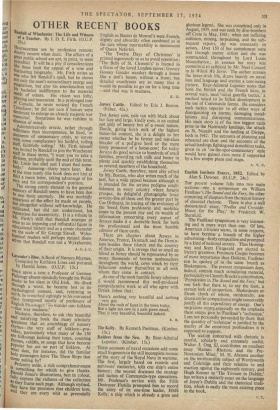OTHER RECENT BOOKS
HEADMASTERS are by profession remote; doubly remote when dead. The affairs of a (treat public school are apt, in print, to seem Parochial. It will be a pity if considerations like these limit the appeal of a wise and fascinating biography. Mr. Firth writes as one who felt Rendall's spell, but he shows not only the man's extraordinary energy and nu►gnetism, but also his emotionalism and his bachelor indifference to the material needs. of others. His vision was lofty, Piercing and inaccurate. In a prolonged tour of Canada he never noticed the French Canadians; he did not care if houses were destroyed to enlarge an already majestic war memorial. Sometimes he was ruthless in absence of mind.
Administratively erratic, rather through Wilfulness than incompetence, he liked, 'at moments of unnecessary crisis, to survey With some complacency his faithful, toiling staff, faithfully toiling.' Mr. Firth himself was invited by Rendall to join the Winchester staff in these terms, 'I want you to take a division, probably until the end of this term. Mr. Little has died and I must find some- body.' Amusing—thirty years later. But St the time surely (the book does not hint at this) a mean letter, taking advantage of his Own and his correspondent's position. The strong comic element in the general memory of Rendall seems to have been due to one basic anomaly. He was morbidly conscious of the effect he made on people, but altogether without self-knowledge. He cultivated, but did not understand, his reputation for eccentricity. It is a tribute to Mr. Firth's skill that Rendall emerges at once as an imposing and influential figure in educational history and as a comic character on the scale of Sir George Sitwell. Wyke- hatnical readers will perhaps remind them- selves that Rendall was not a Wykehamist.
A. O. J. C.


































 Previous page
Previous page